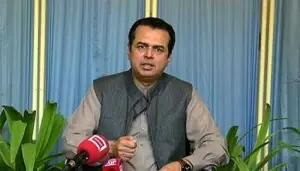New Rahmatul-lil-Aalameen Authority chief's appointment stirs controversy
4 min readThe government's decision to appoint Dr Ejaz Akram as the chairperson of the National Rahmatul-lil-Aalameen Authority – a national body aimed at disseminating lessons from the life of the Holy Prophet (PBUH) - has stirred up a veritable storm on social media.
The reaction was swift as the prime minister's point person on digital media, Dr Arsalan Khalid, announced his appointment for a period of three years. Khalid's thread also highlighted Dr Akram's many accolades and achievements including his PhD in world politics, majors in religion and politics from the Catholic University of America, Washington, DC.
Social media users responded with snippets from Dr Akram's speaking engagements as well as articles attributed to him to highlight his problematic views, including on the country’s ethno-political movements such as the Pashtun Tahaffuz Movement, Jeay Sindh and those spearheaded by Seraikis.
“The enemies of this country [Pakistan] feel that [they] can keep on chipping away [at] Pakistan little by little until nothing of it is left. And so, you have PTM in the Pashtun areas inciting an irredentist passion so that that area can be taken away," he said while addressing a seminar on ‘Commemorating Junagadh Black Day’ that was organised by the Muslim Institute on November 10, 2020, in Islamabad.
He shared similar views about two other movements, and suggested they had taken funds from those who want to break up Pakistan.
He also referred to India as Pakistan's mortal enemy, and has similar views about Israel. "The people who oppose the idea of Pakistan are the forces of global Zionism, based in Israel and the Western capitals of the world.”
The video of the event is available on the YouTube page of the Muslim Institute and was shared on Twitter by journalist Fahad Desmukh.
Several other Twitter users also expressed alarm over the appointment, including retired intelligence official Aamir Mughal, widely respected for his knowledge on Pakistan's history.
Academic Nida Kirmani claimed that Dr Akram held fascist views while sharing an article in which he states that the military has given too much power to civilians.
Former Dawn editor Abbas Nasir also chimed in on the issue, suggesting that "[Dr Ejaz] Akram's loathing of democratic rule, his conspiracy theories" as highlighted in the article were the reasons that he was appointed to the post.
One of the users asked the chairman to explain the status of TLP and TTP in the country.
Several users also claimed that the new chairman had exhibited problematic behaviour when dealing with colleagues and students during the period he was teaching at the Lahore University of Management Sciences.
Several users claimed that Dr Akram was a ''known predator" - including one person who taught there while adding that action was not taken against him as women refused to come forward fearing retribution.

National Rahmatul-Lil-Alameen Authority
According to a statement of the education ministry, the authority has 10 members advisory council comprising Hamza Yusuf, Dr Sayyed Hussain Nasr, Muhammad Faghfoorey, Dr Joseph Lumbard, Waleed al Ansari, Dr Anees Ahmed, Dr Attaur Rehman, Barrister Nusret Majid, Dr Basit Koshul and Dr Sahibzada Sajid Rehman.
President Arif Alvi promulgated an ordinance on October 21 to form the National Rahmatul-Lil-Alameen Authority after the Cabinet's approval for the establishment of the authority.
“Called ‘The National Rahmatul-Lil-Alameen Authority Ordinance’, the document provides for the formation of the said body with the prime minister as its patron and would comprise a chairperson and six other members,” according to the ordinance circulated by the law ministry.
Moreover, a high-level advisory board would also be constituted to provide advice to the patron to meet the authority’s objectives.
The education ministry’s December 7 statement further read that there are six thematic members of the authority who will work in areas like research, international linkages, the role of media, redefining curriculum, outreach and social justice.
It added that the authority would also review the national curriculum to incorporate the Seerat of the Holy Prophet (PBUH), rich values of Islam and ethics.
PM Imran Khan on October 10 announced the formation of the Rehmatul-lil-Aalameen Authority while addressing the Ashra-e-Rehmat-ul-Lil-Aalamin (PBUH) conference in Islamabad. The premier had announced that he would be the patron-in-chief that would seek the advice of esteemed international and national scholars on Seerat un Nabi (SAWW).
“The new authority would be composed of scholars who would be tasked with researching how to spread the Prophet's (PBUH) teachings among children and adults and make it relevant to their lives,” PM Imran had said.
For the latest news, follow us on Twitter @Aaj_Urdu. We are also on Facebook, Instagram and YouTube.





















Comments are closed on this story.